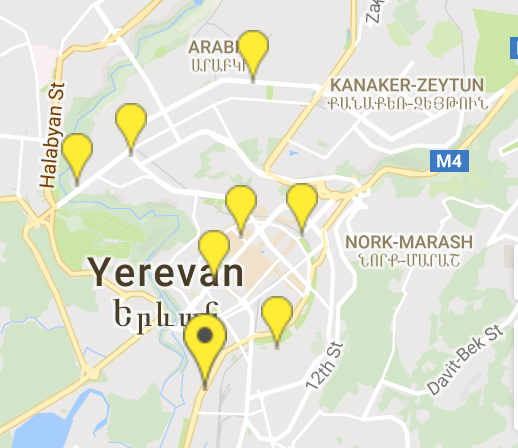

The locations of SAS supermarkets across Yerevan.
Artak Sargsyan, a member of parliament for the ruling Republican Party of Armenia and owner of the SAS Supermarket chain is at the center of a new scandal following the leak of an audio recording released yesterday.
In that recording, a representative of Sargsyan speaks to SAS employees during a staff meeting ahead of the April 2 parliamentary elections where he threatens to fire those who do not present lists of potential RPA voters and ensure that they vote in favor of the party.
The recording quickly made its way through social networks, further cementing the accusations that the RPA used all the levers at its disposal to coerce citizens to vote in their favor.
Armenia’s Prosecutor General has issued a statement that it will conduct an investigation into the recording.
However, there is a deeper concern at the heart of the issue.
Who is protecting the rights of employees?
This latest scandal is simply a reflection of the situation of the labor market – in both private and public sectors. The weaknesses in the Labor Code, inefficient state mechanisms, ineffective trade unions and prevailing employer-employee relations and attitudes in the country have left most employees vulnerable.
State Mechanisms and Legal Provisions
Previously, the rights of workers in Armenia were assigned to the State Labor Inspectorate (SLI) under the Ministry of Labor and Social Affairs. In a 2013 government decree, the SLI and the State Sanitary and Epidemiological Inspection were merged to create the State Health Inspectorate (SHI) under the Ministry of Health.
The International Labor Organization in a 2016 report expressed concern that this decree of reorganizing the labor inspectorate as part of the Ministry of Health does not meet the requirements of Article 4 of the Labor Inspection Convention (organization of the labor inspection services under the control and supervision of a central authority) and Article 9 of the Convention (association of duly qualified technical experts and specialists in the work of the labor inspectorate). The Republic of Armenia is a signatory to that Convention. The SHI does not contribute to the application of the legal provisions concerning labor conditions or pursue the objective of defending workers’ rights.
Today, while the Ministry of Health State Health Inspectorate is responsible for labor protection and safety inspections, the State Employment Agency of the Ministry of Labor and Social Affairs receives notification in the case of mass layoffs only to assist in possible employment opportunities for the newly unemployed. The State Health Inspectorate’s mandate ends in December 2017.
According to the International Trade Union Confederation (ITUC), Armenia has ratified all eight International Labor Organization (ILO) Core Labor Standards Conventions.
Article 45 (Freedom of Associations) in the Constitution of the Republic of Armenia stipulates: “Everyone shall have the right to freedom of association with others, including the right to form and join trade unions for the protection of labour interests. No one may be compelled to join any private association.”
The Trade Unions Confederation of Armenia (CTUA) includes 20 unions with over 200,000 members operating in various sectors and industries. However, the CTUA has been unable to shed its Soviet legacy, when trade unions were mostly formal in practice and much of their mandate was to collect union fees and regulate vacation periods.
Despite the presence of legal provisions and state mechanisms, there are problems within the Law On Trade Unions and in Labor Code of Armenia concerning the legal status of trade unions
Most workers in Armenia today are not well informed about their rights and most don’t even know about the existence of trade unions. Workers need to be informed to be able to exercise their right to unionize and collectively bargain for better working conditions if they so choose.
Putting the issue of freedom of association and the right to unionize aside, the onus and responsibility to protect citizens falls squarely on the shoulders of the state. With high unemployment rates, insecurity and instability, people are desperate to keep their jobs. To take advantage of their vulnerability by threatening them with the loss of their livelihood will only continue to deepen the social and economic polarization in the country.

